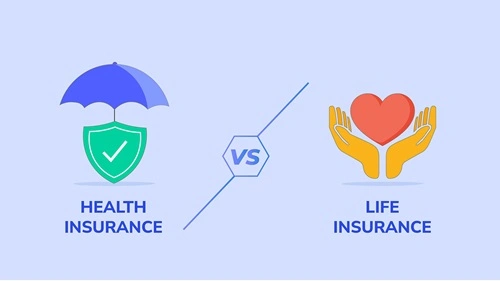When planning for your financial and personal well-being, it’s essential to understand how different types of insurance products work. Two of the most commonly discussed options in this regard are life insurance and health insurance. Although their names might sound similar, they serve distinct purposes and come with unique features, benefits, and limitations. Below is an in-depth explanation of the key differences between life insurance and health insurance, along with a comparative overview to help you decide which one—or both—might best suit your needs.
Purpose and Scope

Life Insurance
-
Primary Goal: Life insurance is designed to provide a financial safety net to your family or beneficiaries in the event of your death.
-
Coverage Focus: It typically pays a lump-sum amount (known as the death benefit) upon your demise, ensuring that your dependents have monetary support to cover living expenses, outstanding debts, or future financial goals such as children’s education.
-
Additional Features: Certain life insurance policies, like whole life or endowment plans, also build cash value over time that you can borrow against during your lifetime. This component acts as a savings or investment feature.
Health Insurance
-
Primary Goal: Health insurance is intended to cover medical expenses incurred due to illness, injury, or other health-related events. Its main objective is to reduce the financial burden of healthcare costs.
-
Coverage Focus: It covers hospitalization expenses, surgical procedures, outpatient treatments, and sometimes even preventive health care services such as vaccinations and routine check-ups.
-
Additional Features: Many health insurance plans offer a range of add-ons such as no claim bonus (NCB), coverage for pre and post-hospitalization expenses, and cashless treatment options at network hospitals.
Benefits and Payouts
Life Insurance
-
Death Benefit: The core feature of life insurance is the payout made to your beneficiaries upon your death. This lump sum can be used to maintain your family’s lifestyle, pay off loans, or meet other financial obligations.
-
Cash Value Component: Some policies (e.g., whole life or universal life) accumulate cash value over time. This money can be utilized through policy loans or even partial withdrawals while the policyholder is alive.
-
Fixed Premiums: In many policies, the premium amount is fixed at the time of purchase. This helps in long-term financial planning, though higher benefits and the cash value component may mean higher premiums.
Health Insurance
-
Medical Expense Coverage: Health insurance policies offer reimbursement or direct payment for medical expenses incurred from hospitalizations, surgeries, diagnostic tests, and other treatments. Some plans also cover day-care procedures and maternity expenses.
-
Renewal Benefits: Health policies typically offer a no claim bonus (NCB) for years when no claims are made, thereby reducing future premiums.
-
Instant Help: Many insurers provide cashless treatment facilities, which means that medical expenses can be settled directly with the network hospitals without the need for upfront payments.
Cost Considerations
Life Insurance
-
Premium Determination: Premiums for life insurance are based on factors such as age, health status, policy term, type of policy (term or permanent), and the sum assured. For example, term life insurance usually comes with lower premiums because it covers only the death benefit.
-
Long-Term Investment: With permanent life policies, the cost is higher due to the dual components of insurance protection and investment.
Health Insurance
-
Premium Determination: Health insurance premiums are influenced by age, pre-existing health conditions, the level of coverage, family size, and lifestyle factors such as smoking habits. The cost can also fluctuate based on geographical location and medical inflation.
-
Annual Renewal: Unlike many life insurance policies which are long-term, health insurance policies are usually annual and need to be renewed. Insurers may raise premiums at renewal based on claim history and rising healthcare costs.
Risk Management and Claims Process
Life Insurance
-
Risk Management: Life insurance risks are largely actuarial in nature, meaning that companies use statistical models to predict the probability of claims over the long term.
-
Claims Process: The claims process for life insurance is relatively straightforward. After the policyholder’s death, the beneficiary submits a claim along with necessary documents (e.g., death certificate, policy documents). Once verified, the claim is paid as a lump sum.
Health Insurance
-
Risk Management: Health insurers handle a different set of risks, with medical inflation and unpredictable health emergencies being major concerns. They closely monitor claim patterns and periodically adjust premiums.
-
Claims Process: The process can be more complex due to the involvement of multiple bills and a wide range of treatments. Most health insurers offer cashless claims at network hospitals, where the hospital verifies and settles the claim directly with the insurer, minimizing the out-of-pocket expense for the insured.
Comparative Overview Table
| Aspect | Life Insurance | Health Insurance |
|---|---|---|
| Primary Purpose | Financial protection for dependents upon the policyholder’s death | Coverage for medical expenses arising from illnesses or injuries |
| Coverage Period | Long-term; policies can be term-based or permanent | Typically annual; requires regular renewal |
| Key Benefit | Lump-sum death benefit; cash value accumulation (in permanent policies) | Reimbursement or direct payment for hospitalization, surgery, and treatments |
| Premium Factors | Age, health, policy term, sum assured, policy type | Age, health conditions, coverage level, family size, medical inflation |
| Payout Frequency | One-time lump sum (for death benefit); possible periodic returns with dividends | Frequent payouts as and when medical expenses occur |
| Investment Component | Yes (in whole or endowment policies) | No; serves purely to offset healthcare costs |
| Claims Process | Beneficiary submits claim with necessary documents after the policyholder’s death | Hospital or insured submits medical bills; cashless options available |
| Use Case | Ensuring financial security of dependents, estate planning, long-term savings | Reducing the burden of high and unpredictable medical costs |
Choosing What Suits Your Needs
Determining which type of policy to prioritize depends on your personal and family financial goals, current health status, and future plans.
-
If protecting your family’s financial future is your primary concern, then investing in a good life insurance policy is crucial. It serves as a long-term safety net and can be used to support dependents over a lifetime.
-
If you are more concerned about managing immediate healthcare costs, then health insurance is essential. Given the rising cost of medical treatments, having a comprehensive health insurance plan can save you significant out-of-pocket expenses, especially during emergencies.
Many financial advisors recommend that individuals have both types of insurance, as they address different needs. Life insurance ensures that your loved ones receive financial support after your demise, while health insurance shields you from potentially catastrophic medical expenses.
Final Thoughts
Understanding the differences between life insurance and health insurance is the first step towards making an informed decision that aligns with your unique situation and long-term financial strategy. While life insurance emphasizes long-term financial security and an investment component, health insurance focuses on managing immediate, ongoing healthcare costs.
Taking the time to assess your priorities, financial responsibilities, and future planning needs can help you build a robust safety net that addresses both long-term and short-term risks.
If you have further questions or need personalized advice, consider consulting with an experienced insurance advisor to ensure that you are well-prepared for every eventuality.

